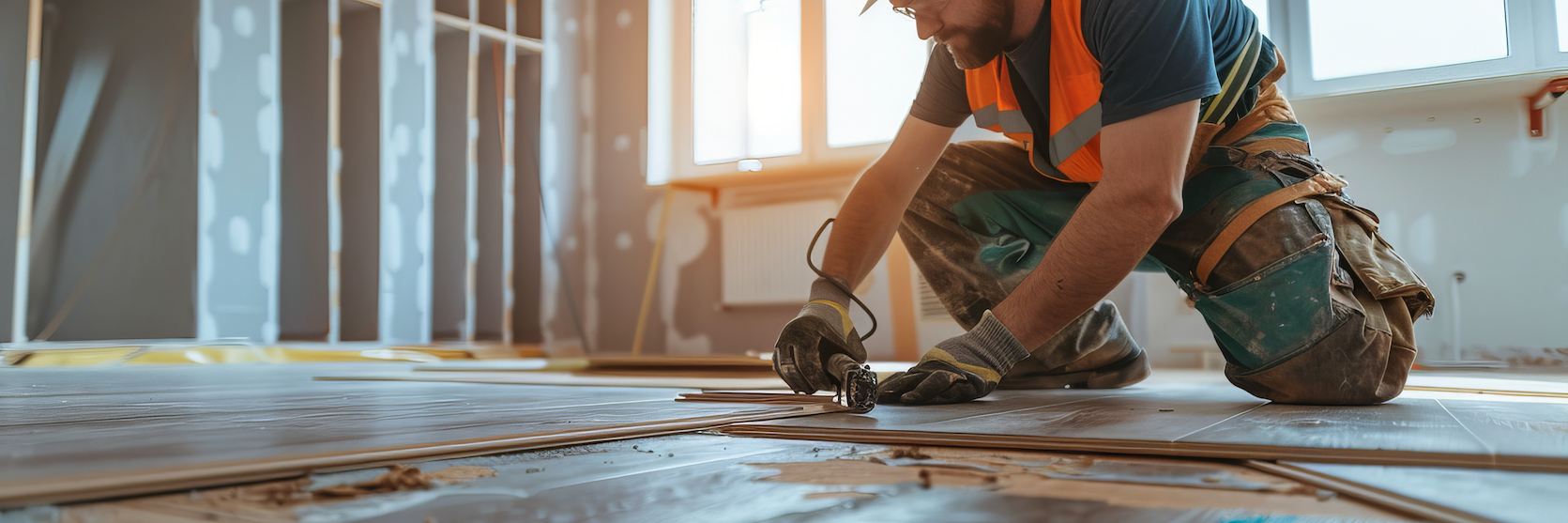How to Hire a Commercial Flooring Contractor
As the person in charge of your project or space, choosing and installing commercial flooring is critical. Selecting an experienced commercial flooring contractor can significantly impact the speed and ease of the installation process.
Finding a top-notch commercial flooring installer can ensure a smooth and efficient installation. Seek recommendations from your network, flooring manufacturer, or industry organizations like the Flooring Contractors Association or Starnet Worldwide. Alternatively, conduct an online search to find the best fit for your project.
One thing to note before beginning your research is whether your project is a union project. Union projects require union installers who must apprentice and complete a set amount of flooring installation hours.
Critical Questions to Ask a Commercial Flooring Installer
Once you have identified promising commercial flooring contractors via your research, ask them the following questions:
Are you adequately insured?
Insurance is crucial as it acts as a safety net. If something goes wrong during installation, the flooring installer’s and workers’ insurance should cover any damages. If your contractor doesn’t have insurance, you might have to pay for any problems during installation.
You could also be responsible for any damage to the area around the installation. Additionally, you may be liable for any injuries that occur. Ensure the contractor has insurance for your peace of mind and protection.
How long have you been installing commercial flooring, and can you provide references?
Ensuring that the flooring installer you hire has the necessary experience is crucial. Ask for references and a list of their completed flooring installation projects, ideally with photos. If the projects are within driving distance, you may even be able to visit them. Equally important, ensure the installer has experience working with your specific flooring type.
How much experience do you have with commercial flooring installations?
Different flooring types require specific subfloor preparation. Renovation projects are more likely to have imperfect subfloors than new construction. The commercial flooring installer should know how to evaluate their condition and make them suitable before installing them. Just be sure the contractor has experience with the flooring type that is being installed.
Do you include subfloor preparation costs when bidding for a project?
Usually, commercial flooring contractors estimate projects based on drawings. As a result, they cannot correctly factor in any needed subfloor preparation without seeing the space in person. When looking at bids, only compare the estimates without subflooring preparation costs to compare apples to apples.
You can compare the material and labor costs by excluding the prep costs. Then, once the contractor is on-site, you can evaluate the subfloor prep costs as a separate bid. This approach ensures transparency and helps you avoid unexpected expenses.
How soon do you recommend beginning the flooring installation in the construction process?
Typically, flooring should be avoided until a permanent working HVAC system and windows are installed. Flooring should also be among the last finished items installed before furnishings. That way, you prevent or minimize damage from other trades fitting the space.
Another reason flooring is among the last items installed is that flooring installation generates a lot of dust. Moreover, the floor could suffer damage from dropped paint or stains. If a contractor recommends installing flooring first, you want to look elsewhere. This recommendation helps protect your investment and ensures a flawless final result.
What is the estimated timing for installation?
Based on the construction timeline, the flooring contractor should be able to provide you with an approximate installation date. That also helps determine a date for when furniture delivery. By reading the flooring manufacturer’s installation manual, the contractor will know when furniture can be put on the floor without damaging it.
For example, depending on the type of flooring, AHF Contract® recommends a minimum of 24 hours without foot traffic and a minimum of 72 hours without heavy or rolling traffic for its products. This information helps in planning and coordinating other aspects of your project.

How will the flooring contractor handle clean-up?
Ask the commercial flooring installer if they will be responsible for disposing of any remnants and cleaning the flooring surface before leaving. You may also want to ask if they will provide floor protection. For instance, some commercial flooring installers put down heavy-duty craft paper, like Ram Board, to protect the flooring until the space is ready for the grand opening.
Doing so minimizes the risk of damage from tradespeople who may come in after installing the flooring, such as paint spatters, dirt, or debris tracking. Ensuring a thorough clean-up process maintains the aesthetic and integrity of your new flooring.
Do you offer a warranty or an extended warranty?
Typically, the commercial flooring product you purchase comes with a manufacturer warranty. In addition to the product warranty, most commercial flooring contractors offer a one-year installation warranty, and some offer extended warranties.
You’ll want to know what warranties they offer and what they cover. Having a warranty in place ensures that you can address issues promptly, protecting your investment.
Can you work on multiple projects simultaneously?
Sometimes, you have more than one flooring installation happening at once. So, being able to consult one contact for all your projects will help to simplify the process. Look for an installer with additional branches of their own business.
Otherwise, see if they can recommend another installer to save you time and money. This capability ensures consistency and coordination across multiple sites, streamlining your overall project management.
What is the payment schedule?
You’ll want to see the flooring contractor’s payment schedule beforehand. Learn when and if they require a deposit before installation. Also, determine when the final payment is due to help you budget properly. Clear payment terms prevent misunderstandings and ensure a smooth financial transaction.
What are my responsibilities?
Ask what the flooring contractor expects you to do to install the flooring efficiently. For example, you may have to move furnishings and other materials in and out of the project area. Understanding your responsibilities helps avoid delays and ensures a smooth installation process.
Can you provide a detailed project timeline?
A detailed project timeline helps coordinate with other aspects of your project. Knowing the exact timeline from start to finish, including any potential delays, allows for better planning and resource allocation.
How do you handle unexpected issues or complications during the installation?
Knowing how the contractor manages unforeseen problems, such as hidden subfloor damage or material shortages, is essential. Understanding their approach to unexpected issues provides peace of mind and ensures the project can continue smoothly without significant disruptions.
What specific training and certifications do your installers have?
Verify that the installers have relevant certifications and training, especially for specialized flooring types like hardwood, heterogeneous, homogeneous, or VCT. Ensuring the team is well-trained and certified guarantees high-quality workmanship and adherence to industry standards.
Can you provide a portfolio of completed projects similar to mine?
Reviewing similar past projects can give you an idea of their expertise and the quality of their work. A portfolio showcasing completed projects like yours allows you to assess their capability and style. It ensures the contractor is a good fit for your needs.
What steps do you take to ensure safety on the job site?
Safety protocols are crucial in preventing accidents and ensuring a smooth project. Inquire about their safety measures, such as worker protective gear and adherence to safety regulations.
How do you ensure the quality of the installation?
Ask about their quality assurance processes, including any inspections or follow-ups after the installation. Understanding their commitment to quality helps ensure that the final result meets your expectations.
What environmental considerations do you take into account?
Inquire about their sustainability practices, such as using eco-friendly materials or recycling old flooring. Understanding their environmental policies ensures that your project aligns with sustainability goals and reduces its ecological footprint.
Finding the Right Commercial Flooring Contractor Makes All the Difference
The answers to these questions ensure that you hire a professional commercial flooring installer. It also provides realistic expectations for both the contractor and you regarding your flooring project.
Of course, the foundation of any successful commercial flooring installation project is the flooring itself. AHF Contract offers numerous design options, from textured flooring and vivid colors to natural looks and unique patterns. The flooring also delivers outstanding performance. The company’s Resource Center is also helpful for finding more information about installation, technical information, specifications, and more.

